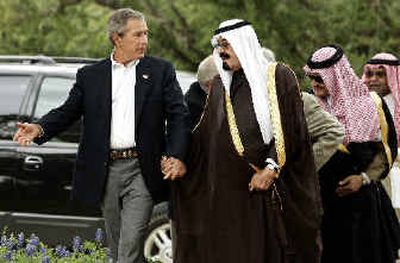Bush wants help on gas prices

CRAWFORD, Texas – President Bush prodded Saudi Arabia’s Crown Prince Abdullah on Monday to help curb skyrocketing oil prices, and the White House expressed hope that the kingdom’s plans would ease U.S. gasoline prices that have shot above $2.20 a gallon.
“A high oil price will damage markets, and he knows that,” Bush said of Abdullah, the de facto leader of the desert kingdom.
Asked whether pump prices will drop, Bush said that will depend on supply and demand.
“One thing is for certain: The price of crude is driving the price of gasoline,” Bush said. “The price of crude is up because not only is our economy growing, but economies such as India’s and China’s also are growing.”
Saudi Arabia has outlined a plan to increase production capacity to 12.5 million barrels a day by 2009 from the current 11 million limit. Saudi Arabia now pumps about 9.5 million barrels daily. If necessary, Saudi Arabia says it eventually will develop a capacity of 15 million barrels a day.
National security adviser Stephen Hadley said the plan could be seen as positive news by financial markets.
“The problem in the oil market now is a perception that there is inadequate capacity,” Hadley said. Reassurance that can be given to the market on available supply, he said, should “have a downward pressure on the price.”
On another economic issue, the United States and Saudi Arabia are on the verge of a bilateral trade agreement that would allow the Persian Gulf nation to join the World Trade Organization by the end of the year, Abdullah’s foreign affairs adviser, Adel Al-Jubeir, told reporters.
Other issues, including terrorism, prospects for peace between the Israelis and Palestinians, Syria’s role in Lebanon and democratic change in the Middle East, filled the leaders’ meeting and discussion over lunch. They agreed to set up a high-level committee, headed by Secretary of State Condoleezza Rice and the Saudi foreign minister, to deal with strategic issues.
Spreading democracy is a second-term goal that could affect Bush’s legacy, yet high gas prices are a drag on his popularity.
Bush has been urging Congress to pass his energy plan, but even the president has said it will do little to give motorists short-term relief high gas prices. In Washington, Sen. John Kerry, D-Mass., said Bush’s meeting with Abdullah was a reminder of America’s dependence on foreign oil. He said fewer than 5 percent of the incentives in the energy bill were devoted to developing alternative energy sources.
Al-Jubeir said Saudi Arabia is producing all the oil that its customers are requesting. He said the price is being driven up by a shortage of refining capacity.
A U.S. push for democratic change across the Arab world faces a difficult test with Saudi Arabia, a longtime ally ruled by a monarchy. Last week, Saudi Arabia completed its first nationwide elections, an experiment in democracy designed to take the steam out of militant Islamic movements.
The council posts that were on the ballots, however, have little power, and women were not allowed to vote. Moreover, the United States has long-standing concerns about human and civil rights in Saudi Arabia.
A joint statement by the two leaders reflected tensions over the issue of democratic change. It said: “While the United States considers that nations will create institutions that reflect the history, culture and traditions of their societies, it does not seek to impose its own style of government on the government and people of Saudi Arabia.”
Both nations also agreed to cooperate in fighting terrorists. U.S.-Saudi relations were strained after the 2001 terrorist attacks, in which 15 of the 19 airplane hijackers were Saudis. But American officials have been much more satisfied with anti-terror efforts the Saudis have undertaken since militants’ May 2003 attacks in Riyadh.